Importance of Tourism in Current Business Environment and Role of its Key Stakeholders
VerifiedAdded on 2023/01/11
|14
|3912
|38
AI Summary
This report focuses on the tourism in Morocco, which is officially known as the Kingdom of Morocco, a nation located in the Maghreb region in the Northern part of the African continent. It discusses the importance of tourism in the current business environment and the role of its key stakeholders. It also explores the economic dimensions of tourism in Morocco and the motivations of tourists to travel to the country.
Contribute Materials
Your contribution can guide someone’s learning journey. Share your
documents today.
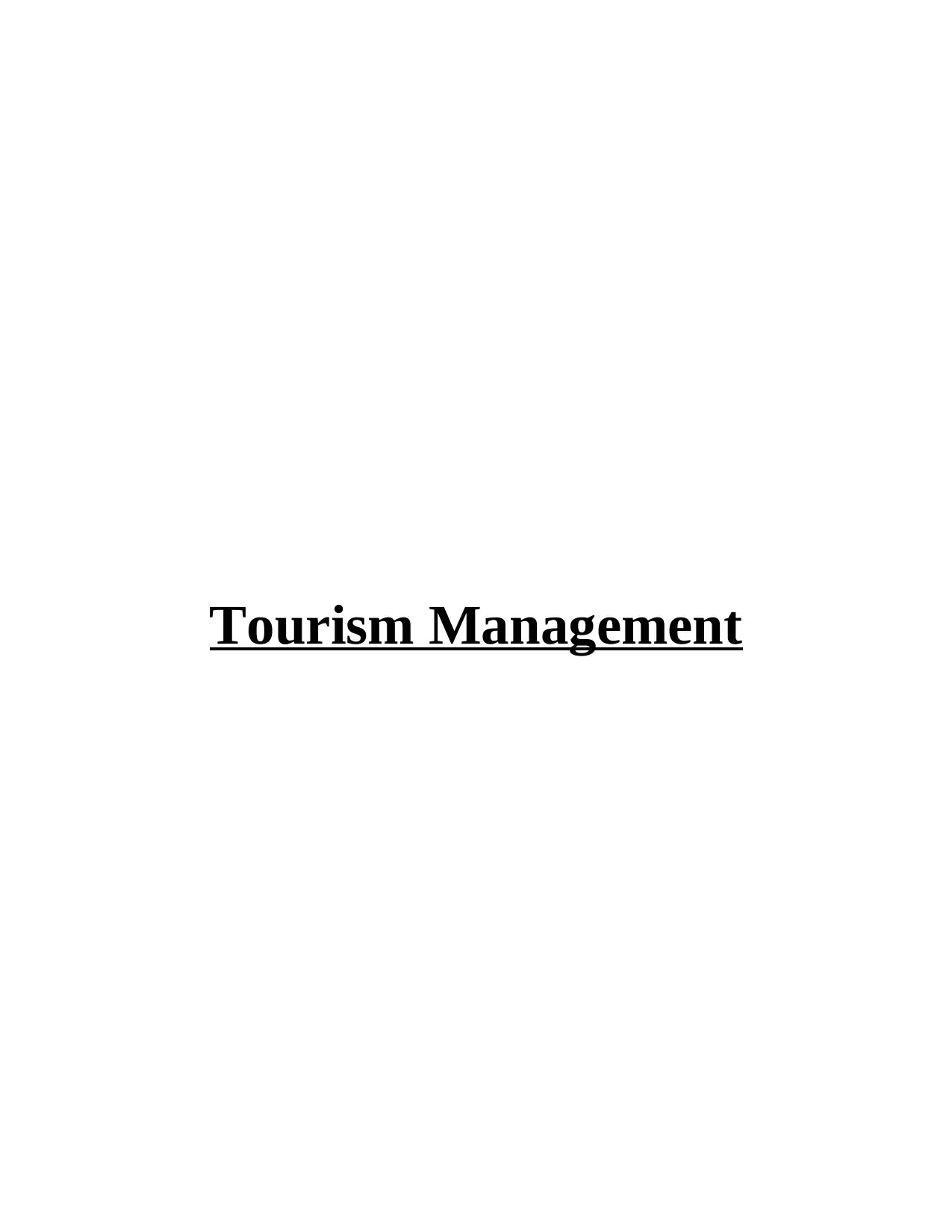
Tourism Management
Secure Best Marks with AI Grader
Need help grading? Try our AI Grader for instant feedback on your assignments.
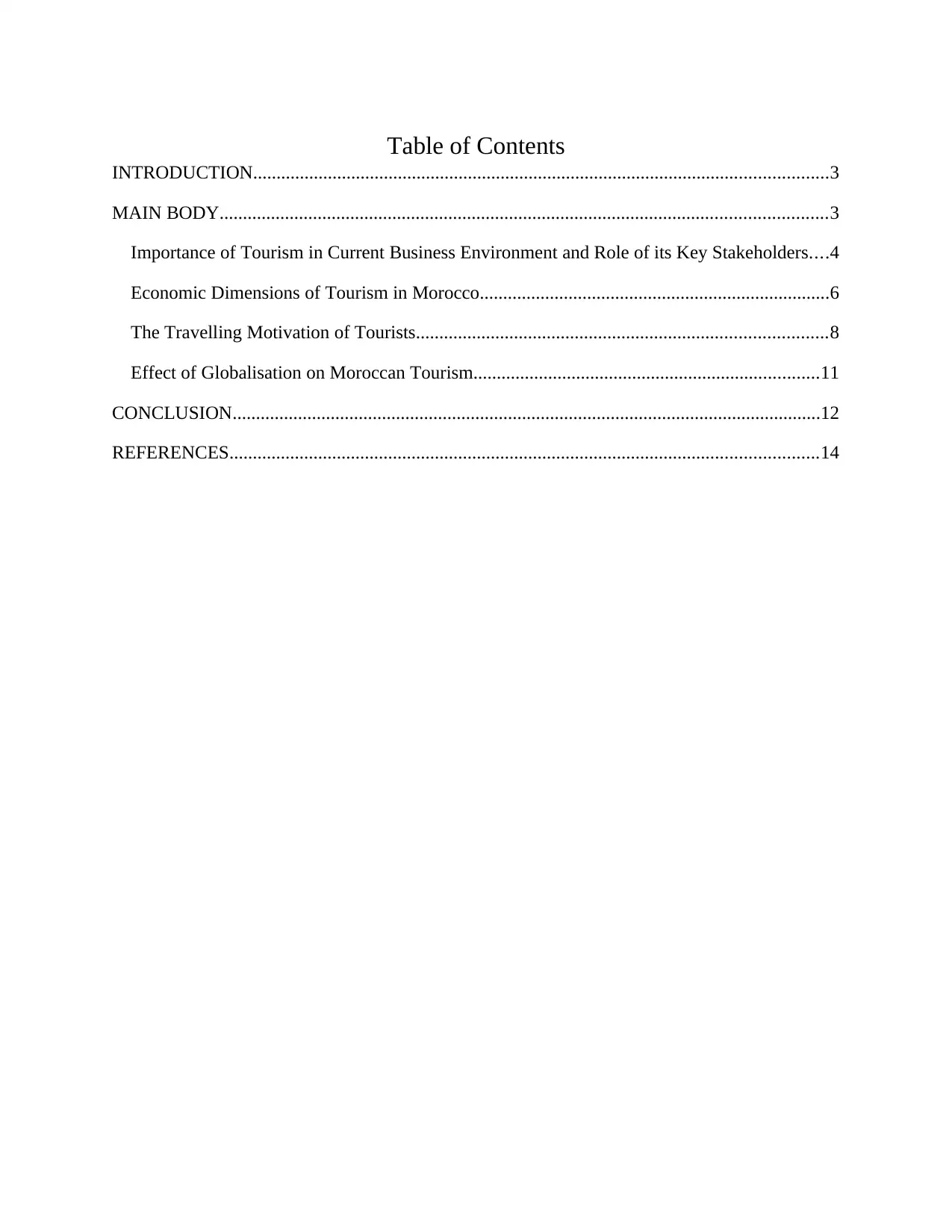
Table of Contents
INTRODUCTION...........................................................................................................................3
MAIN BODY..................................................................................................................................3
Importance of Tourism in Current Business Environment and Role of its Key Stakeholders....4
Economic Dimensions of Tourism in Morocco...........................................................................6
The Travelling Motivation of Tourists........................................................................................8
Effect of Globalisation on Moroccan Tourism..........................................................................11
CONCLUSION..............................................................................................................................12
REFERENCES..............................................................................................................................14
INTRODUCTION...........................................................................................................................3
MAIN BODY..................................................................................................................................3
Importance of Tourism in Current Business Environment and Role of its Key Stakeholders....4
Economic Dimensions of Tourism in Morocco...........................................................................6
The Travelling Motivation of Tourists........................................................................................8
Effect of Globalisation on Moroccan Tourism..........................................................................11
CONCLUSION..............................................................................................................................12
REFERENCES..............................................................................................................................14
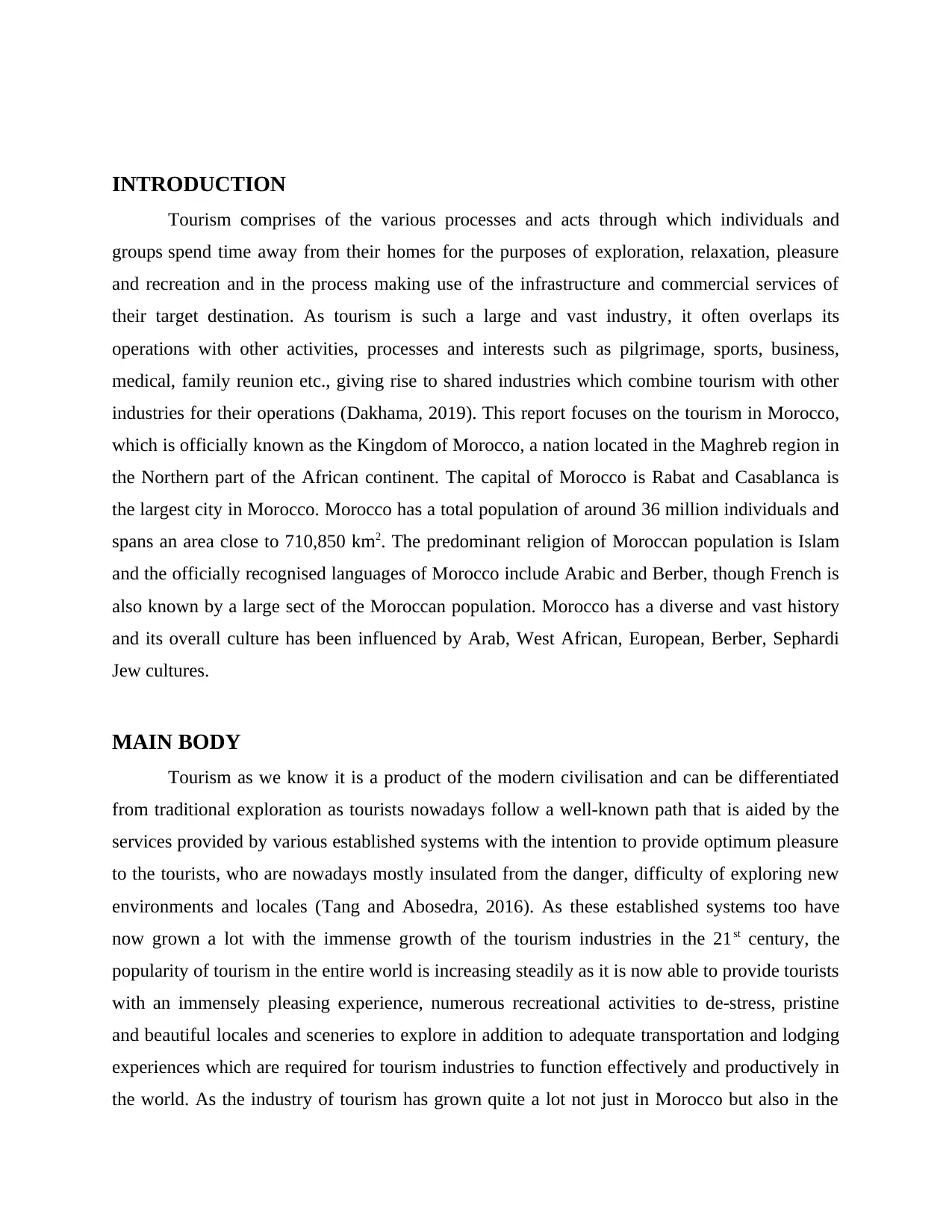
INTRODUCTION
Tourism comprises of the various processes and acts through which individuals and
groups spend time away from their homes for the purposes of exploration, relaxation, pleasure
and recreation and in the process making use of the infrastructure and commercial services of
their target destination. As tourism is such a large and vast industry, it often overlaps its
operations with other activities, processes and interests such as pilgrimage, sports, business,
medical, family reunion etc., giving rise to shared industries which combine tourism with other
industries for their operations (Dakhama, 2019). This report focuses on the tourism in Morocco,
which is officially known as the Kingdom of Morocco, a nation located in the Maghreb region in
the Northern part of the African continent. The capital of Morocco is Rabat and Casablanca is
the largest city in Morocco. Morocco has a total population of around 36 million individuals and
spans an area close to 710,850 km2. The predominant religion of Moroccan population is Islam
and the officially recognised languages of Morocco include Arabic and Berber, though French is
also known by a large sect of the Moroccan population. Morocco has a diverse and vast history
and its overall culture has been influenced by Arab, West African, European, Berber, Sephardi
Jew cultures.
MAIN BODY
Tourism as we know it is a product of the modern civilisation and can be differentiated
from traditional exploration as tourists nowadays follow a well-known path that is aided by the
services provided by various established systems with the intention to provide optimum pleasure
to the tourists, who are nowadays mostly insulated from the danger, difficulty of exploring new
environments and locales (Tang and Abosedra, 2016). As these established systems too have
now grown a lot with the immense growth of the tourism industries in the 21st century, the
popularity of tourism in the entire world is increasing steadily as it is now able to provide tourists
with an immensely pleasing experience, numerous recreational activities to de-stress, pristine
and beautiful locales and sceneries to explore in addition to adequate transportation and lodging
experiences which are required for tourism industries to function effectively and productively in
the world. As the industry of tourism has grown quite a lot not just in Morocco but also in the
Tourism comprises of the various processes and acts through which individuals and
groups spend time away from their homes for the purposes of exploration, relaxation, pleasure
and recreation and in the process making use of the infrastructure and commercial services of
their target destination. As tourism is such a large and vast industry, it often overlaps its
operations with other activities, processes and interests such as pilgrimage, sports, business,
medical, family reunion etc., giving rise to shared industries which combine tourism with other
industries for their operations (Dakhama, 2019). This report focuses on the tourism in Morocco,
which is officially known as the Kingdom of Morocco, a nation located in the Maghreb region in
the Northern part of the African continent. The capital of Morocco is Rabat and Casablanca is
the largest city in Morocco. Morocco has a total population of around 36 million individuals and
spans an area close to 710,850 km2. The predominant religion of Moroccan population is Islam
and the officially recognised languages of Morocco include Arabic and Berber, though French is
also known by a large sect of the Moroccan population. Morocco has a diverse and vast history
and its overall culture has been influenced by Arab, West African, European, Berber, Sephardi
Jew cultures.
MAIN BODY
Tourism as we know it is a product of the modern civilisation and can be differentiated
from traditional exploration as tourists nowadays follow a well-known path that is aided by the
services provided by various established systems with the intention to provide optimum pleasure
to the tourists, who are nowadays mostly insulated from the danger, difficulty of exploring new
environments and locales (Tang and Abosedra, 2016). As these established systems too have
now grown a lot with the immense growth of the tourism industries in the 21st century, the
popularity of tourism in the entire world is increasing steadily as it is now able to provide tourists
with an immensely pleasing experience, numerous recreational activities to de-stress, pristine
and beautiful locales and sceneries to explore in addition to adequate transportation and lodging
experiences which are required for tourism industries to function effectively and productively in
the world. As the industry of tourism has grown quite a lot not just in Morocco but also in the
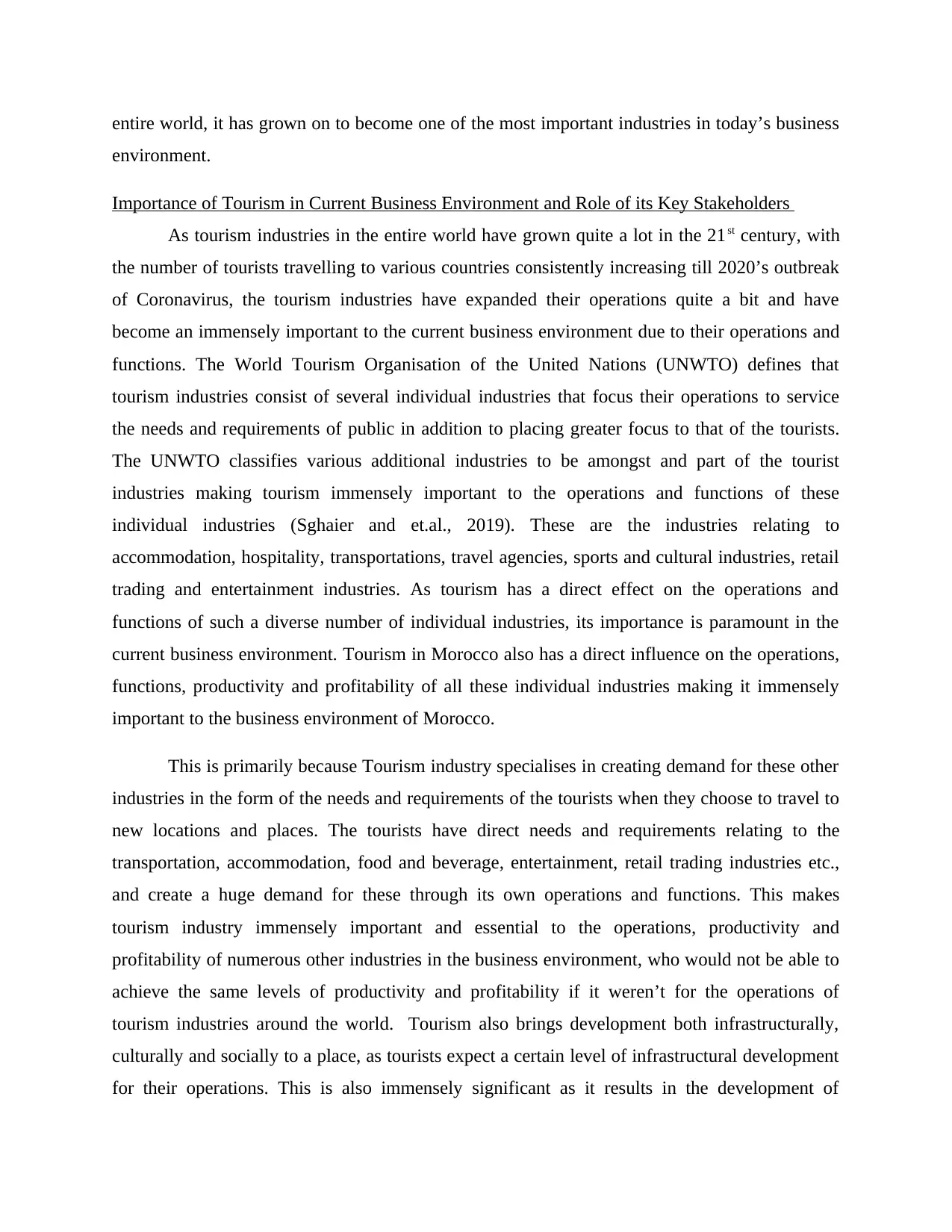
entire world, it has grown on to become one of the most important industries in today’s business
environment.
Importance of Tourism in Current Business Environment and Role of its Key Stakeholders
As tourism industries in the entire world have grown quite a lot in the 21st century, with
the number of tourists travelling to various countries consistently increasing till 2020’s outbreak
of Coronavirus, the tourism industries have expanded their operations quite a bit and have
become an immensely important to the current business environment due to their operations and
functions. The World Tourism Organisation of the United Nations (UNWTO) defines that
tourism industries consist of several individual industries that focus their operations to service
the needs and requirements of public in addition to placing greater focus to that of the tourists.
The UNWTO classifies various additional industries to be amongst and part of the tourist
industries making tourism immensely important to the operations and functions of these
individual industries (Sghaier and et.al., 2019). These are the industries relating to
accommodation, hospitality, transportations, travel agencies, sports and cultural industries, retail
trading and entertainment industries. As tourism has a direct effect on the operations and
functions of such a diverse number of individual industries, its importance is paramount in the
current business environment. Tourism in Morocco also has a direct influence on the operations,
functions, productivity and profitability of all these individual industries making it immensely
important to the business environment of Morocco.
This is primarily because Tourism industry specialises in creating demand for these other
industries in the form of the needs and requirements of the tourists when they choose to travel to
new locations and places. The tourists have direct needs and requirements relating to the
transportation, accommodation, food and beverage, entertainment, retail trading industries etc.,
and create a huge demand for these through its own operations and functions. This makes
tourism industry immensely important and essential to the operations, productivity and
profitability of numerous other industries in the business environment, who would not be able to
achieve the same levels of productivity and profitability if it weren’t for the operations of
tourism industries around the world. Tourism also brings development both infrastructurally,
culturally and socially to a place, as tourists expect a certain level of infrastructural development
for their operations. This is also immensely significant as it results in the development of
environment.
Importance of Tourism in Current Business Environment and Role of its Key Stakeholders
As tourism industries in the entire world have grown quite a lot in the 21st century, with
the number of tourists travelling to various countries consistently increasing till 2020’s outbreak
of Coronavirus, the tourism industries have expanded their operations quite a bit and have
become an immensely important to the current business environment due to their operations and
functions. The World Tourism Organisation of the United Nations (UNWTO) defines that
tourism industries consist of several individual industries that focus their operations to service
the needs and requirements of public in addition to placing greater focus to that of the tourists.
The UNWTO classifies various additional industries to be amongst and part of the tourist
industries making tourism immensely important to the operations and functions of these
individual industries (Sghaier and et.al., 2019). These are the industries relating to
accommodation, hospitality, transportations, travel agencies, sports and cultural industries, retail
trading and entertainment industries. As tourism has a direct effect on the operations and
functions of such a diverse number of individual industries, its importance is paramount in the
current business environment. Tourism in Morocco also has a direct influence on the operations,
functions, productivity and profitability of all these individual industries making it immensely
important to the business environment of Morocco.
This is primarily because Tourism industry specialises in creating demand for these other
industries in the form of the needs and requirements of the tourists when they choose to travel to
new locations and places. The tourists have direct needs and requirements relating to the
transportation, accommodation, food and beverage, entertainment, retail trading industries etc.,
and create a huge demand for these through its own operations and functions. This makes
tourism industry immensely important and essential to the operations, productivity and
profitability of numerous other industries in the business environment, who would not be able to
achieve the same levels of productivity and profitability if it weren’t for the operations of
tourism industries around the world. Tourism also brings development both infrastructurally,
culturally and socially to a place, as tourists expect a certain level of infrastructural development
for their operations. This is also immensely significant as it results in the development of
Secure Best Marks with AI Grader
Need help grading? Try our AI Grader for instant feedback on your assignments.
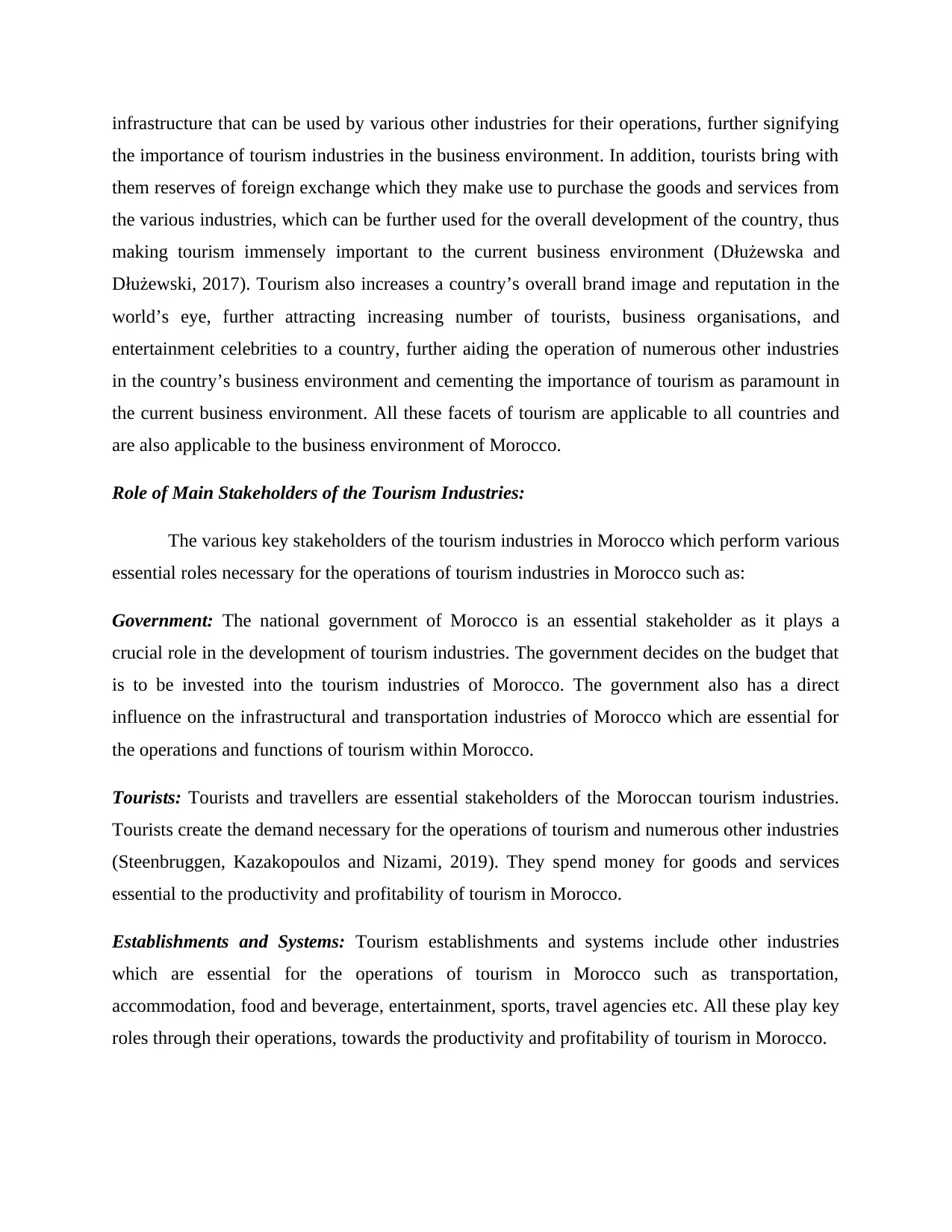
infrastructure that can be used by various other industries for their operations, further signifying
the importance of tourism industries in the business environment. In addition, tourists bring with
them reserves of foreign exchange which they make use to purchase the goods and services from
the various industries, which can be further used for the overall development of the country, thus
making tourism immensely important to the current business environment (Dłużewska and
Dłużewski, 2017). Tourism also increases a country’s overall brand image and reputation in the
world’s eye, further attracting increasing number of tourists, business organisations, and
entertainment celebrities to a country, further aiding the operation of numerous other industries
in the country’s business environment and cementing the importance of tourism as paramount in
the current business environment. All these facets of tourism are applicable to all countries and
are also applicable to the business environment of Morocco.
Role of Main Stakeholders of the Tourism Industries:
The various key stakeholders of the tourism industries in Morocco which perform various
essential roles necessary for the operations of tourism industries in Morocco such as:
Government: The national government of Morocco is an essential stakeholder as it plays a
crucial role in the development of tourism industries. The government decides on the budget that
is to be invested into the tourism industries of Morocco. The government also has a direct
influence on the infrastructural and transportation industries of Morocco which are essential for
the operations and functions of tourism within Morocco.
Tourists: Tourists and travellers are essential stakeholders of the Moroccan tourism industries.
Tourists create the demand necessary for the operations of tourism and numerous other industries
(Steenbruggen, Kazakopoulos and Nizami, 2019). They spend money for goods and services
essential to the productivity and profitability of tourism in Morocco.
Establishments and Systems: Tourism establishments and systems include other industries
which are essential for the operations of tourism in Morocco such as transportation,
accommodation, food and beverage, entertainment, sports, travel agencies etc. All these play key
roles through their operations, towards the productivity and profitability of tourism in Morocco.
the importance of tourism industries in the business environment. In addition, tourists bring with
them reserves of foreign exchange which they make use to purchase the goods and services from
the various industries, which can be further used for the overall development of the country, thus
making tourism immensely important to the current business environment (Dłużewska and
Dłużewski, 2017). Tourism also increases a country’s overall brand image and reputation in the
world’s eye, further attracting increasing number of tourists, business organisations, and
entertainment celebrities to a country, further aiding the operation of numerous other industries
in the country’s business environment and cementing the importance of tourism as paramount in
the current business environment. All these facets of tourism are applicable to all countries and
are also applicable to the business environment of Morocco.
Role of Main Stakeholders of the Tourism Industries:
The various key stakeholders of the tourism industries in Morocco which perform various
essential roles necessary for the operations of tourism industries in Morocco such as:
Government: The national government of Morocco is an essential stakeholder as it plays a
crucial role in the development of tourism industries. The government decides on the budget that
is to be invested into the tourism industries of Morocco. The government also has a direct
influence on the infrastructural and transportation industries of Morocco which are essential for
the operations and functions of tourism within Morocco.
Tourists: Tourists and travellers are essential stakeholders of the Moroccan tourism industries.
Tourists create the demand necessary for the operations of tourism and numerous other industries
(Steenbruggen, Kazakopoulos and Nizami, 2019). They spend money for goods and services
essential to the productivity and profitability of tourism in Morocco.
Establishments and Systems: Tourism establishments and systems include other industries
which are essential for the operations of tourism in Morocco such as transportation,
accommodation, food and beverage, entertainment, sports, travel agencies etc. All these play key
roles through their operations, towards the productivity and profitability of tourism in Morocco.
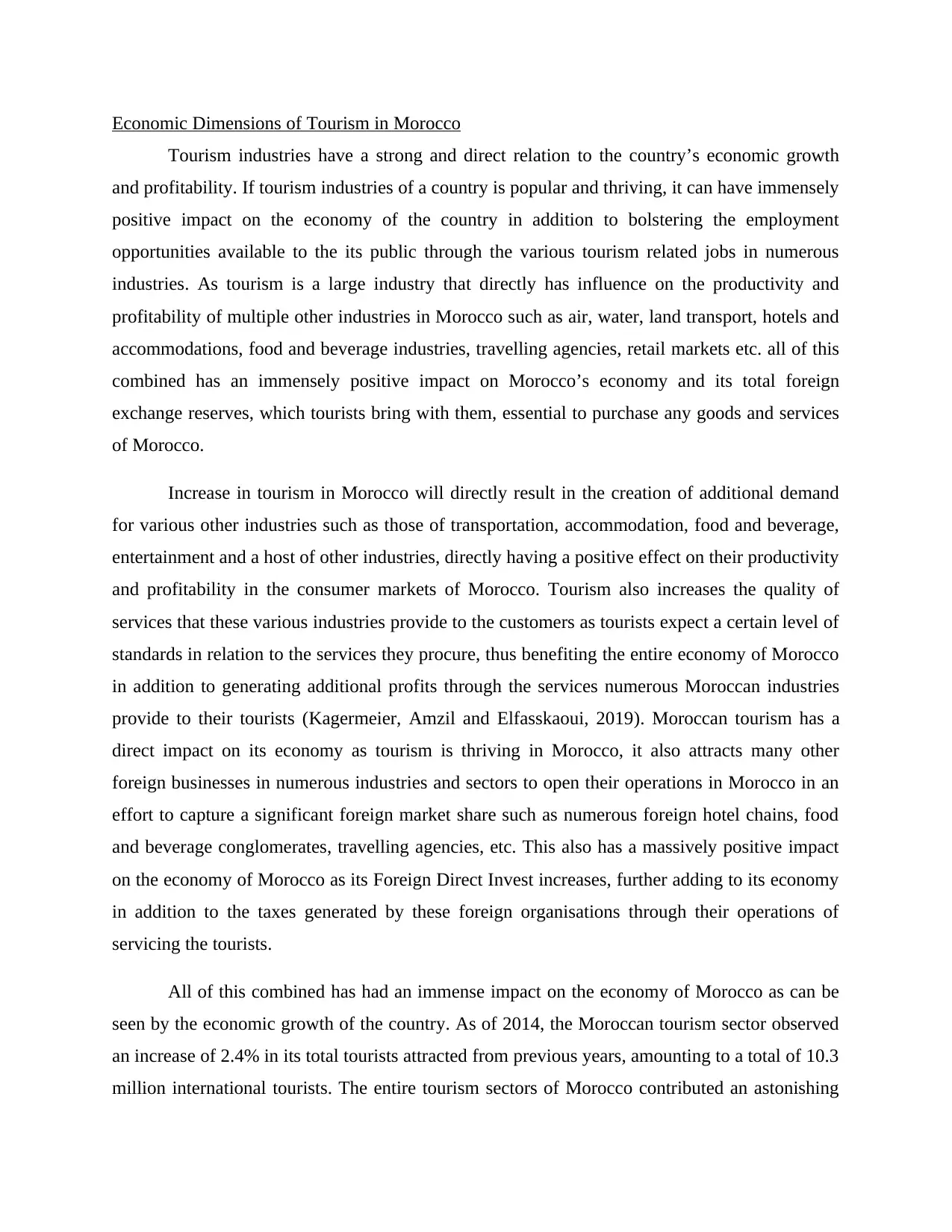
Economic Dimensions of Tourism in Morocco
Tourism industries have a strong and direct relation to the country’s economic growth
and profitability. If tourism industries of a country is popular and thriving, it can have immensely
positive impact on the economy of the country in addition to bolstering the employment
opportunities available to the its public through the various tourism related jobs in numerous
industries. As tourism is a large industry that directly has influence on the productivity and
profitability of multiple other industries in Morocco such as air, water, land transport, hotels and
accommodations, food and beverage industries, travelling agencies, retail markets etc. all of this
combined has an immensely positive impact on Morocco’s economy and its total foreign
exchange reserves, which tourists bring with them, essential to purchase any goods and services
of Morocco.
Increase in tourism in Morocco will directly result in the creation of additional demand
for various other industries such as those of transportation, accommodation, food and beverage,
entertainment and a host of other industries, directly having a positive effect on their productivity
and profitability in the consumer markets of Morocco. Tourism also increases the quality of
services that these various industries provide to the customers as tourists expect a certain level of
standards in relation to the services they procure, thus benefiting the entire economy of Morocco
in addition to generating additional profits through the services numerous Moroccan industries
provide to their tourists (Kagermeier, Amzil and Elfasskaoui, 2019). Moroccan tourism has a
direct impact on its economy as tourism is thriving in Morocco, it also attracts many other
foreign businesses in numerous industries and sectors to open their operations in Morocco in an
effort to capture a significant foreign market share such as numerous foreign hotel chains, food
and beverage conglomerates, travelling agencies, etc. This also has a massively positive impact
on the economy of Morocco as its Foreign Direct Invest increases, further adding to its economy
in addition to the taxes generated by these foreign organisations through their operations of
servicing the tourists.
All of this combined has had an immense impact on the economy of Morocco as can be
seen by the economic growth of the country. As of 2014, the Moroccan tourism sector observed
an increase of 2.4% in its total tourists attracted from previous years, amounting to a total of 10.3
million international tourists. The entire tourism sectors of Morocco contributed an astonishing
Tourism industries have a strong and direct relation to the country’s economic growth
and profitability. If tourism industries of a country is popular and thriving, it can have immensely
positive impact on the economy of the country in addition to bolstering the employment
opportunities available to the its public through the various tourism related jobs in numerous
industries. As tourism is a large industry that directly has influence on the productivity and
profitability of multiple other industries in Morocco such as air, water, land transport, hotels and
accommodations, food and beverage industries, travelling agencies, retail markets etc. all of this
combined has an immensely positive impact on Morocco’s economy and its total foreign
exchange reserves, which tourists bring with them, essential to purchase any goods and services
of Morocco.
Increase in tourism in Morocco will directly result in the creation of additional demand
for various other industries such as those of transportation, accommodation, food and beverage,
entertainment and a host of other industries, directly having a positive effect on their productivity
and profitability in the consumer markets of Morocco. Tourism also increases the quality of
services that these various industries provide to the customers as tourists expect a certain level of
standards in relation to the services they procure, thus benefiting the entire economy of Morocco
in addition to generating additional profits through the services numerous Moroccan industries
provide to their tourists (Kagermeier, Amzil and Elfasskaoui, 2019). Moroccan tourism has a
direct impact on its economy as tourism is thriving in Morocco, it also attracts many other
foreign businesses in numerous industries and sectors to open their operations in Morocco in an
effort to capture a significant foreign market share such as numerous foreign hotel chains, food
and beverage conglomerates, travelling agencies, etc. This also has a massively positive impact
on the economy of Morocco as its Foreign Direct Invest increases, further adding to its economy
in addition to the taxes generated by these foreign organisations through their operations of
servicing the tourists.
All of this combined has had an immense impact on the economy of Morocco as can be
seen by the economic growth of the country. As of 2014, the Moroccan tourism sector observed
an increase of 2.4% in its total tourists attracted from previous years, amounting to a total of 10.3
million international tourists. The entire tourism sectors of Morocco contributed an astonishing
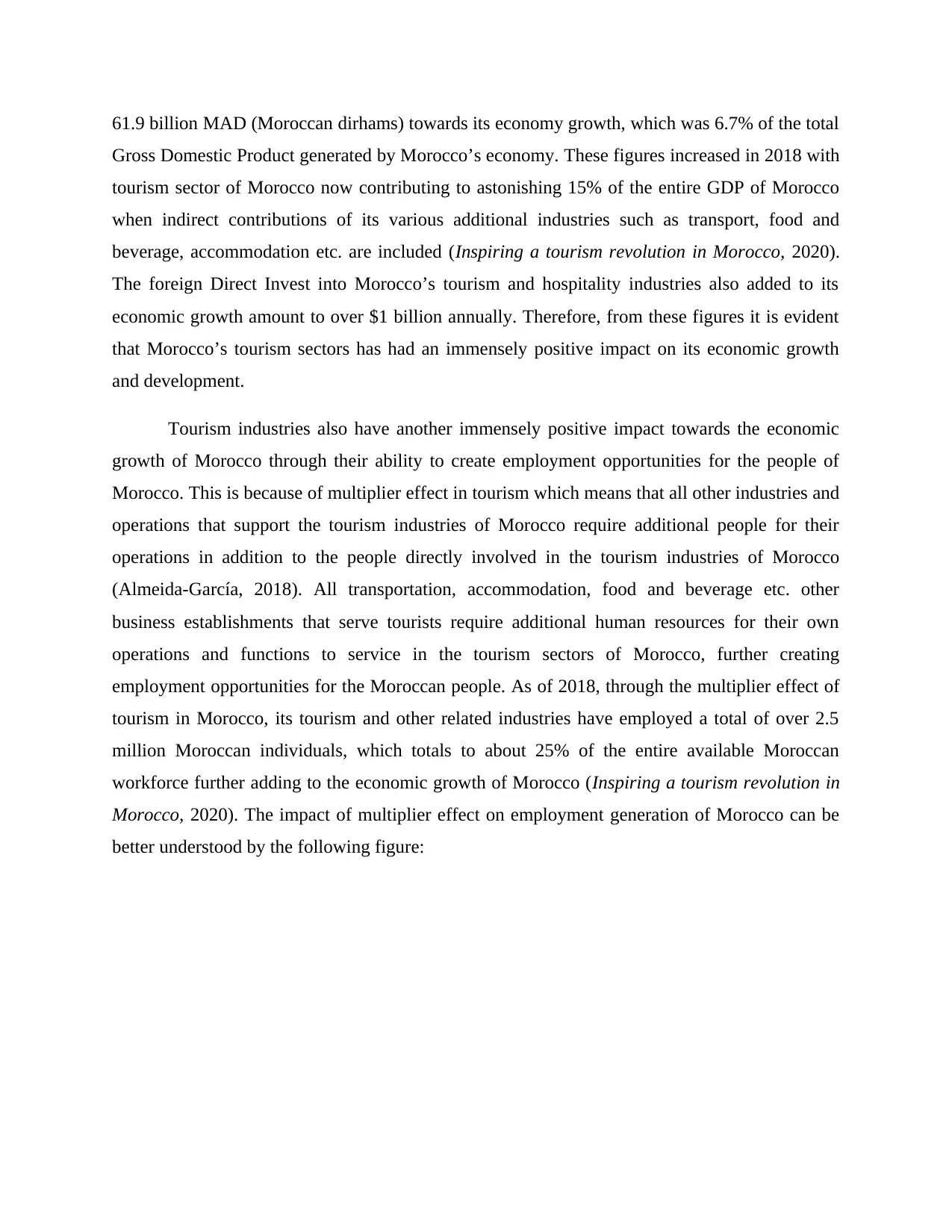
61.9 billion MAD (Moroccan dirhams) towards its economy growth, which was 6.7% of the total
Gross Domestic Product generated by Morocco’s economy. These figures increased in 2018 with
tourism sector of Morocco now contributing to astonishing 15% of the entire GDP of Morocco
when indirect contributions of its various additional industries such as transport, food and
beverage, accommodation etc. are included (Inspiring a tourism revolution in Morocco, 2020).
The foreign Direct Invest into Morocco’s tourism and hospitality industries also added to its
economic growth amount to over $1 billion annually. Therefore, from these figures it is evident
that Morocco’s tourism sectors has had an immensely positive impact on its economic growth
and development.
Tourism industries also have another immensely positive impact towards the economic
growth of Morocco through their ability to create employment opportunities for the people of
Morocco. This is because of multiplier effect in tourism which means that all other industries and
operations that support the tourism industries of Morocco require additional people for their
operations in addition to the people directly involved in the tourism industries of Morocco
(Almeida-García, 2018). All transportation, accommodation, food and beverage etc. other
business establishments that serve tourists require additional human resources for their own
operations and functions to service in the tourism sectors of Morocco, further creating
employment opportunities for the Moroccan people. As of 2018, through the multiplier effect of
tourism in Morocco, its tourism and other related industries have employed a total of over 2.5
million Moroccan individuals, which totals to about 25% of the entire available Moroccan
workforce further adding to the economic growth of Morocco (Inspiring a tourism revolution in
Morocco, 2020). The impact of multiplier effect on employment generation of Morocco can be
better understood by the following figure:
Gross Domestic Product generated by Morocco’s economy. These figures increased in 2018 with
tourism sector of Morocco now contributing to astonishing 15% of the entire GDP of Morocco
when indirect contributions of its various additional industries such as transport, food and
beverage, accommodation etc. are included (Inspiring a tourism revolution in Morocco, 2020).
The foreign Direct Invest into Morocco’s tourism and hospitality industries also added to its
economic growth amount to over $1 billion annually. Therefore, from these figures it is evident
that Morocco’s tourism sectors has had an immensely positive impact on its economic growth
and development.
Tourism industries also have another immensely positive impact towards the economic
growth of Morocco through their ability to create employment opportunities for the people of
Morocco. This is because of multiplier effect in tourism which means that all other industries and
operations that support the tourism industries of Morocco require additional people for their
operations in addition to the people directly involved in the tourism industries of Morocco
(Almeida-García, 2018). All transportation, accommodation, food and beverage etc. other
business establishments that serve tourists require additional human resources for their own
operations and functions to service in the tourism sectors of Morocco, further creating
employment opportunities for the Moroccan people. As of 2018, through the multiplier effect of
tourism in Morocco, its tourism and other related industries have employed a total of over 2.5
million Moroccan individuals, which totals to about 25% of the entire available Moroccan
workforce further adding to the economic growth of Morocco (Inspiring a tourism revolution in
Morocco, 2020). The impact of multiplier effect on employment generation of Morocco can be
better understood by the following figure:
Paraphrase This Document
Need a fresh take? Get an instant paraphrase of this document with our AI Paraphraser
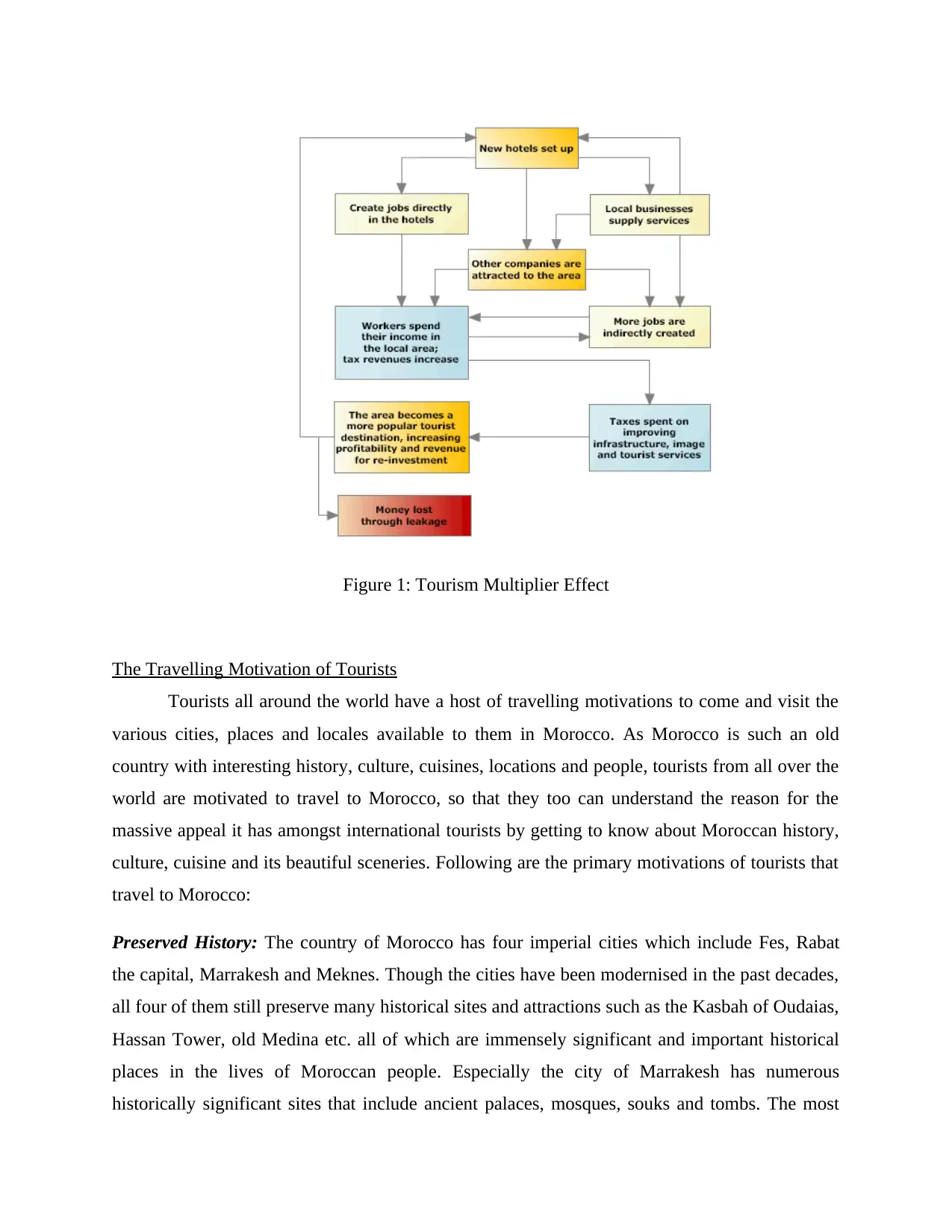
Figure 1: Tourism Multiplier Effect
The Travelling Motivation of Tourists
Tourists all around the world have a host of travelling motivations to come and visit the
various cities, places and locales available to them in Morocco. As Morocco is such an old
country with interesting history, culture, cuisines, locations and people, tourists from all over the
world are motivated to travel to Morocco, so that they too can understand the reason for the
massive appeal it has amongst international tourists by getting to know about Moroccan history,
culture, cuisine and its beautiful sceneries. Following are the primary motivations of tourists that
travel to Morocco:
Preserved History: The country of Morocco has four imperial cities which include Fes, Rabat
the capital, Marrakesh and Meknes. Though the cities have been modernised in the past decades,
all four of them still preserve many historical sites and attractions such as the Kasbah of Oudaias,
Hassan Tower, old Medina etc. all of which are immensely significant and important historical
places in the lives of Moroccan people. Especially the city of Marrakesh has numerous
historically significant sites that include ancient palaces, mosques, souks and tombs. The most
The Travelling Motivation of Tourists
Tourists all around the world have a host of travelling motivations to come and visit the
various cities, places and locales available to them in Morocco. As Morocco is such an old
country with interesting history, culture, cuisines, locations and people, tourists from all over the
world are motivated to travel to Morocco, so that they too can understand the reason for the
massive appeal it has amongst international tourists by getting to know about Moroccan history,
culture, cuisine and its beautiful sceneries. Following are the primary motivations of tourists that
travel to Morocco:
Preserved History: The country of Morocco has four imperial cities which include Fes, Rabat
the capital, Marrakesh and Meknes. Though the cities have been modernised in the past decades,
all four of them still preserve many historical sites and attractions such as the Kasbah of Oudaias,
Hassan Tower, old Medina etc. all of which are immensely significant and important historical
places in the lives of Moroccan people. Especially the city of Marrakesh has numerous
historically significant sites that include ancient palaces, mosques, souks and tombs. The most
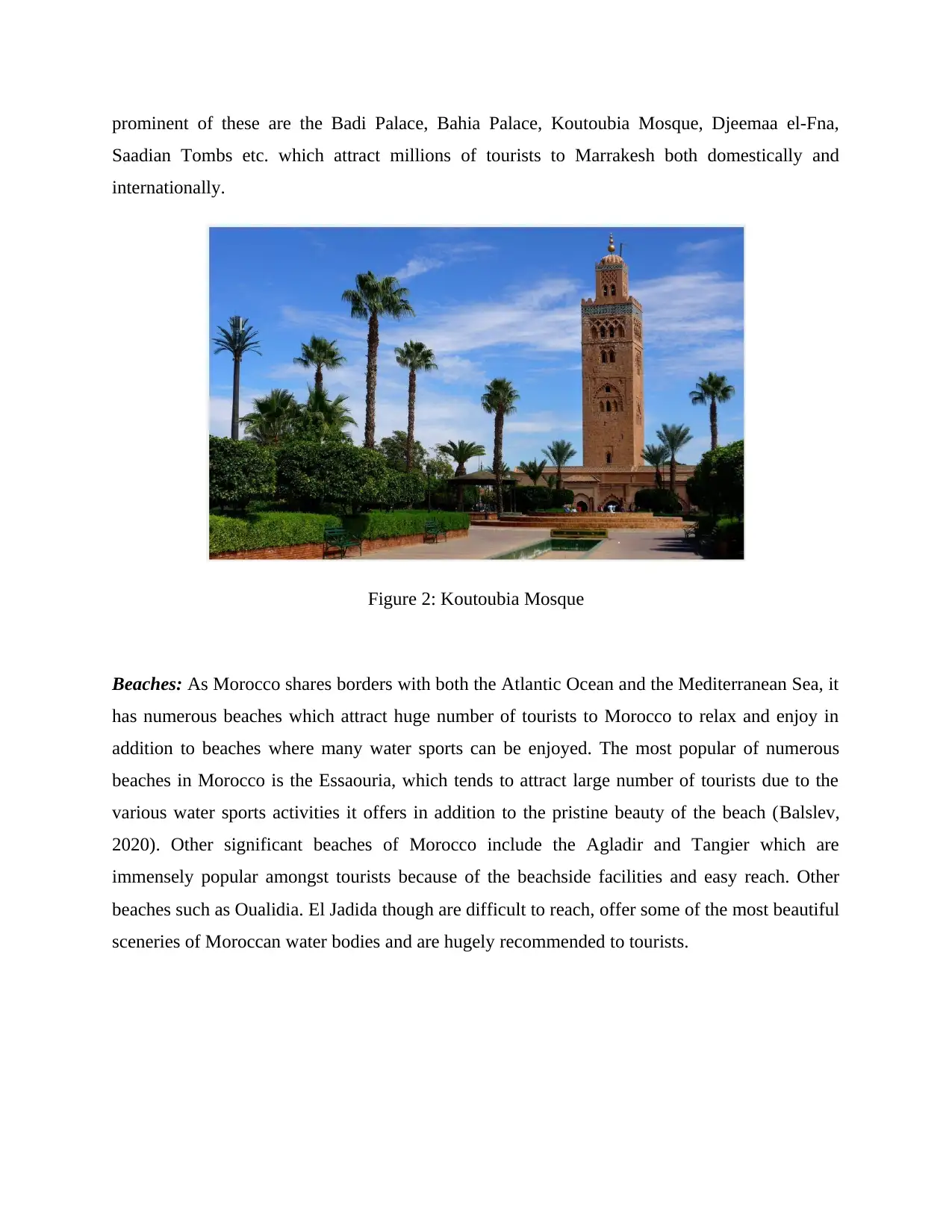
prominent of these are the Badi Palace, Bahia Palace, Koutoubia Mosque, Djeemaa el-Fna,
Saadian Tombs etc. which attract millions of tourists to Marrakesh both domestically and
internationally.
Figure 2: Koutoubia Mosque
Beaches: As Morocco shares borders with both the Atlantic Ocean and the Mediterranean Sea, it
has numerous beaches which attract huge number of tourists to Morocco to relax and enjoy in
addition to beaches where many water sports can be enjoyed. The most popular of numerous
beaches in Morocco is the Essaouria, which tends to attract large number of tourists due to the
various water sports activities it offers in addition to the pristine beauty of the beach (Balslev,
2020). Other significant beaches of Morocco include the Agladir and Tangier which are
immensely popular amongst tourists because of the beachside facilities and easy reach. Other
beaches such as Oualidia. El Jadida though are difficult to reach, offer some of the most beautiful
sceneries of Moroccan water bodies and are hugely recommended to tourists.
Saadian Tombs etc. which attract millions of tourists to Marrakesh both domestically and
internationally.
Figure 2: Koutoubia Mosque
Beaches: As Morocco shares borders with both the Atlantic Ocean and the Mediterranean Sea, it
has numerous beaches which attract huge number of tourists to Morocco to relax and enjoy in
addition to beaches where many water sports can be enjoyed. The most popular of numerous
beaches in Morocco is the Essaouria, which tends to attract large number of tourists due to the
various water sports activities it offers in addition to the pristine beauty of the beach (Balslev,
2020). Other significant beaches of Morocco include the Agladir and Tangier which are
immensely popular amongst tourists because of the beachside facilities and easy reach. Other
beaches such as Oualidia. El Jadida though are difficult to reach, offer some of the most beautiful
sceneries of Moroccan water bodies and are hugely recommended to tourists.
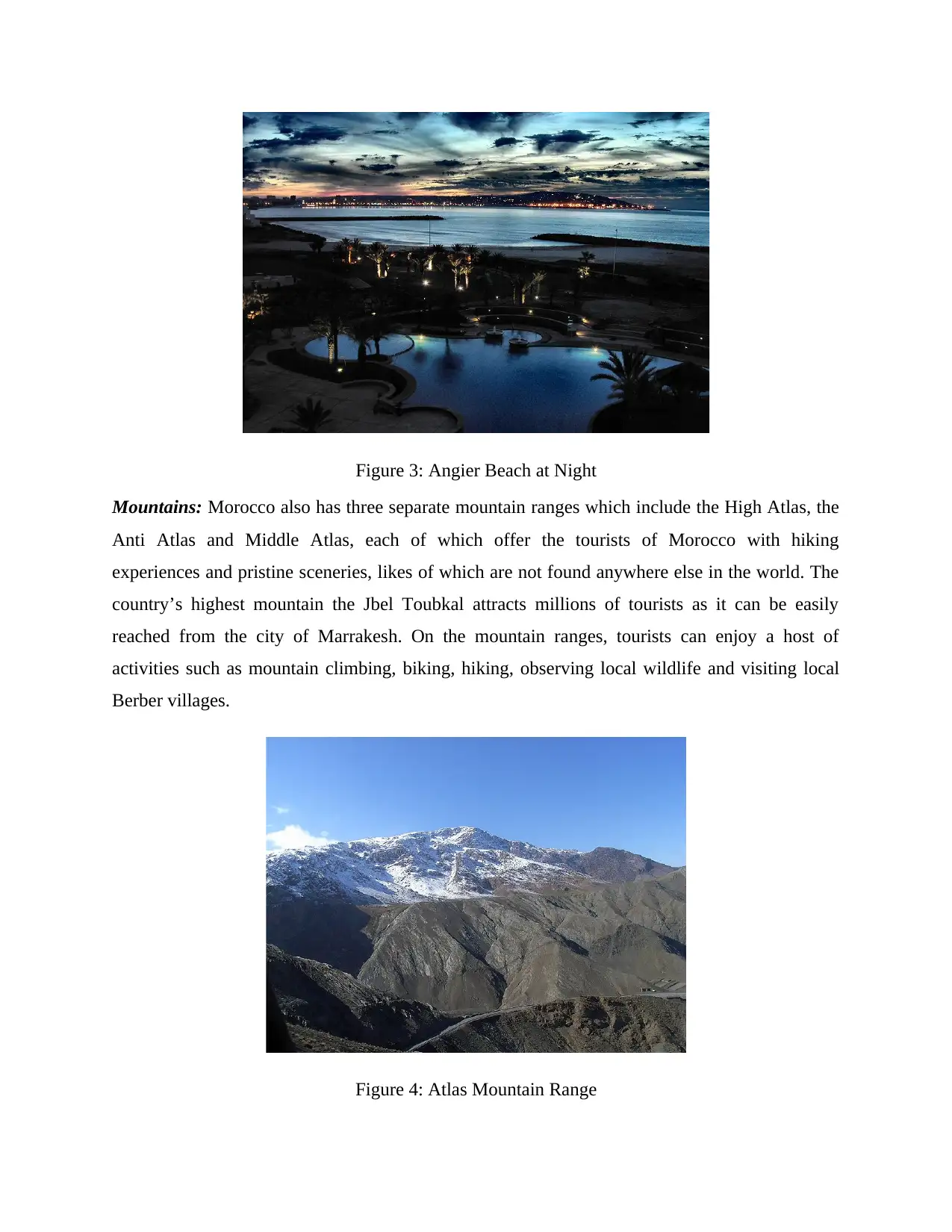
Figure 3: Angier Beach at Night
Mountains: Morocco also has three separate mountain ranges which include the High Atlas, the
Anti Atlas and Middle Atlas, each of which offer the tourists of Morocco with hiking
experiences and pristine sceneries, likes of which are not found anywhere else in the world. The
country’s highest mountain the Jbel Toubkal attracts millions of tourists as it can be easily
reached from the city of Marrakesh. On the mountain ranges, tourists can enjoy a host of
activities such as mountain climbing, biking, hiking, observing local wildlife and visiting local
Berber villages.
Figure 4: Atlas Mountain Range
Mountains: Morocco also has three separate mountain ranges which include the High Atlas, the
Anti Atlas and Middle Atlas, each of which offer the tourists of Morocco with hiking
experiences and pristine sceneries, likes of which are not found anywhere else in the world. The
country’s highest mountain the Jbel Toubkal attracts millions of tourists as it can be easily
reached from the city of Marrakesh. On the mountain ranges, tourists can enjoy a host of
activities such as mountain climbing, biking, hiking, observing local wildlife and visiting local
Berber villages.
Figure 4: Atlas Mountain Range
Secure Best Marks with AI Grader
Need help grading? Try our AI Grader for instant feedback on your assignments.
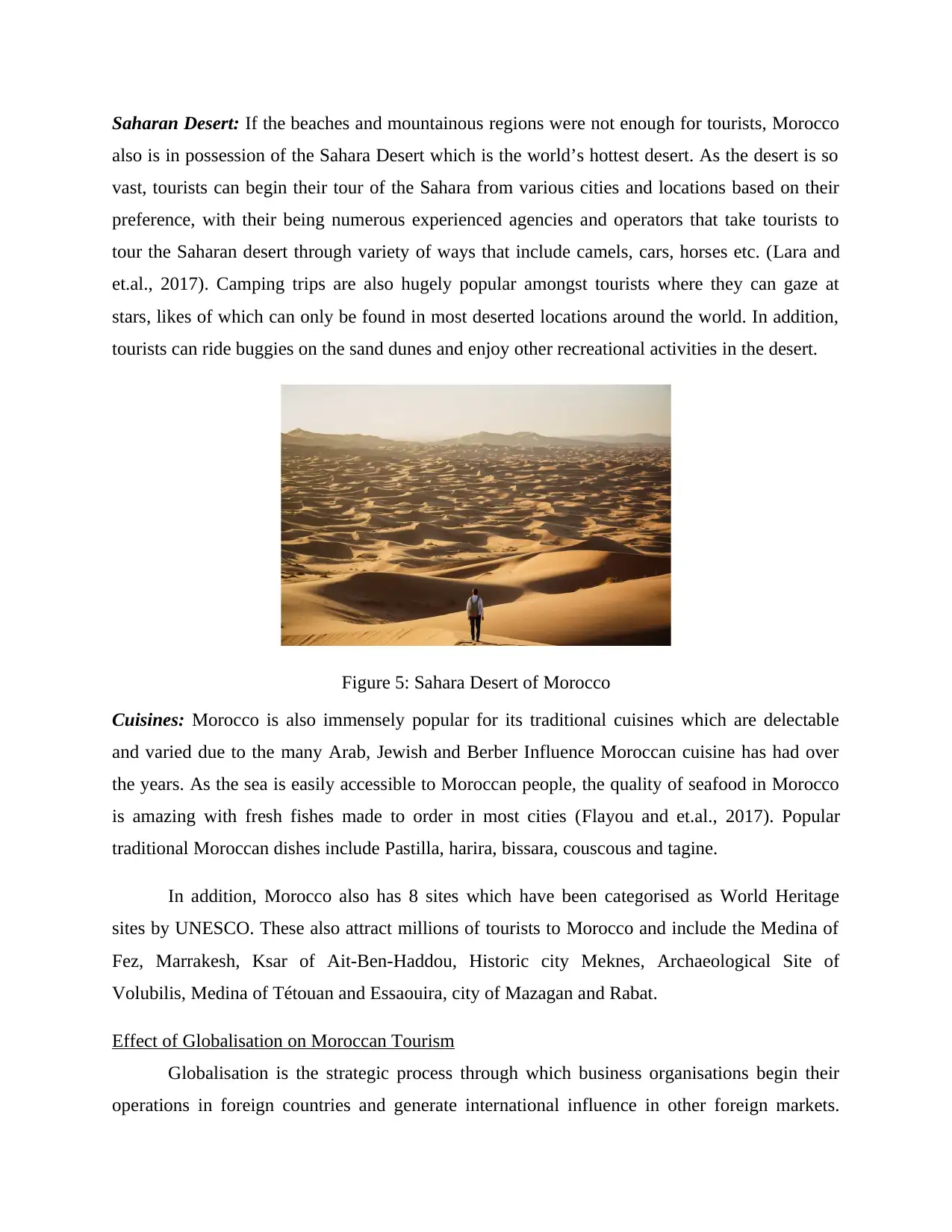
Saharan Desert: If the beaches and mountainous regions were not enough for tourists, Morocco
also is in possession of the Sahara Desert which is the world’s hottest desert. As the desert is so
vast, tourists can begin their tour of the Sahara from various cities and locations based on their
preference, with their being numerous experienced agencies and operators that take tourists to
tour the Saharan desert through variety of ways that include camels, cars, horses etc. (Lara and
et.al., 2017). Camping trips are also hugely popular amongst tourists where they can gaze at
stars, likes of which can only be found in most deserted locations around the world. In addition,
tourists can ride buggies on the sand dunes and enjoy other recreational activities in the desert.
Figure 5: Sahara Desert of Morocco
Cuisines: Morocco is also immensely popular for its traditional cuisines which are delectable
and varied due to the many Arab, Jewish and Berber Influence Moroccan cuisine has had over
the years. As the sea is easily accessible to Moroccan people, the quality of seafood in Morocco
is amazing with fresh fishes made to order in most cities (Flayou and et.al., 2017). Popular
traditional Moroccan dishes include Pastilla, harira, bissara, couscous and tagine.
In addition, Morocco also has 8 sites which have been categorised as World Heritage
sites by UNESCO. These also attract millions of tourists to Morocco and include the Medina of
Fez, Marrakesh, Ksar of Ait-Ben-Haddou, Historic city Meknes, Archaeological Site of
Volubilis, Medina of Tétouan and Essaouira, city of Mazagan and Rabat.
Effect of Globalisation on Moroccan Tourism
Globalisation is the strategic process through which business organisations begin their
operations in foreign countries and generate international influence in other foreign markets.
also is in possession of the Sahara Desert which is the world’s hottest desert. As the desert is so
vast, tourists can begin their tour of the Sahara from various cities and locations based on their
preference, with their being numerous experienced agencies and operators that take tourists to
tour the Saharan desert through variety of ways that include camels, cars, horses etc. (Lara and
et.al., 2017). Camping trips are also hugely popular amongst tourists where they can gaze at
stars, likes of which can only be found in most deserted locations around the world. In addition,
tourists can ride buggies on the sand dunes and enjoy other recreational activities in the desert.
Figure 5: Sahara Desert of Morocco
Cuisines: Morocco is also immensely popular for its traditional cuisines which are delectable
and varied due to the many Arab, Jewish and Berber Influence Moroccan cuisine has had over
the years. As the sea is easily accessible to Moroccan people, the quality of seafood in Morocco
is amazing with fresh fishes made to order in most cities (Flayou and et.al., 2017). Popular
traditional Moroccan dishes include Pastilla, harira, bissara, couscous and tagine.
In addition, Morocco also has 8 sites which have been categorised as World Heritage
sites by UNESCO. These also attract millions of tourists to Morocco and include the Medina of
Fez, Marrakesh, Ksar of Ait-Ben-Haddou, Historic city Meknes, Archaeological Site of
Volubilis, Medina of Tétouan and Essaouira, city of Mazagan and Rabat.
Effect of Globalisation on Moroccan Tourism
Globalisation is the strategic process through which business organisations begin their
operations in foreign countries and generate international influence in other foreign markets.
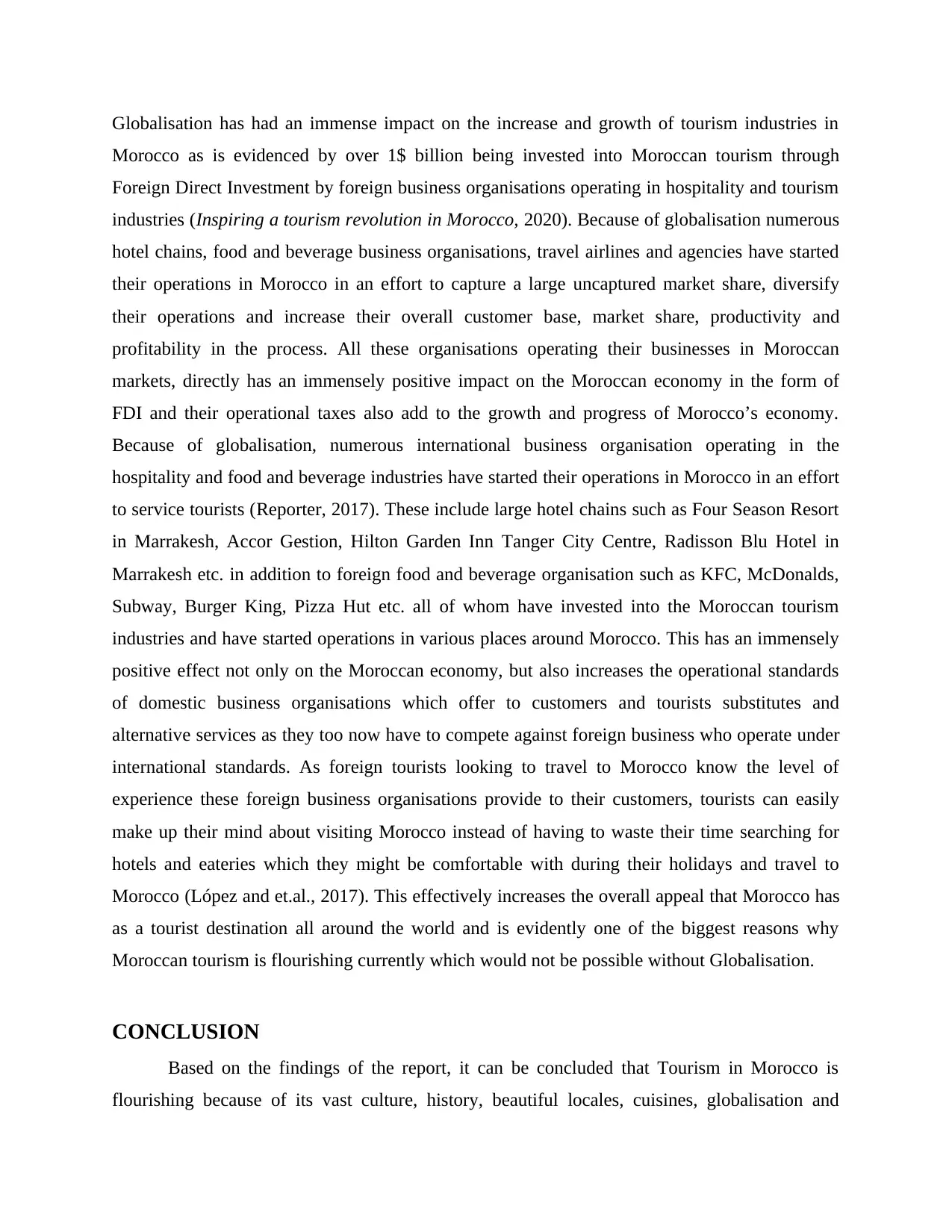
Globalisation has had an immense impact on the increase and growth of tourism industries in
Morocco as is evidenced by over 1$ billion being invested into Moroccan tourism through
Foreign Direct Investment by foreign business organisations operating in hospitality and tourism
industries (Inspiring a tourism revolution in Morocco, 2020). Because of globalisation numerous
hotel chains, food and beverage business organisations, travel airlines and agencies have started
their operations in Morocco in an effort to capture a large uncaptured market share, diversify
their operations and increase their overall customer base, market share, productivity and
profitability in the process. All these organisations operating their businesses in Moroccan
markets, directly has an immensely positive impact on the Moroccan economy in the form of
FDI and their operational taxes also add to the growth and progress of Morocco’s economy.
Because of globalisation, numerous international business organisation operating in the
hospitality and food and beverage industries have started their operations in Morocco in an effort
to service tourists (Reporter, 2017). These include large hotel chains such as Four Season Resort
in Marrakesh, Accor Gestion, Hilton Garden Inn Tanger City Centre, Radisson Blu Hotel in
Marrakesh etc. in addition to foreign food and beverage organisation such as KFC, McDonalds,
Subway, Burger King, Pizza Hut etc. all of whom have invested into the Moroccan tourism
industries and have started operations in various places around Morocco. This has an immensely
positive effect not only on the Moroccan economy, but also increases the operational standards
of domestic business organisations which offer to customers and tourists substitutes and
alternative services as they too now have to compete against foreign business who operate under
international standards. As foreign tourists looking to travel to Morocco know the level of
experience these foreign business organisations provide to their customers, tourists can easily
make up their mind about visiting Morocco instead of having to waste their time searching for
hotels and eateries which they might be comfortable with during their holidays and travel to
Morocco (López and et.al., 2017). This effectively increases the overall appeal that Morocco has
as a tourist destination all around the world and is evidently one of the biggest reasons why
Moroccan tourism is flourishing currently which would not be possible without Globalisation.
CONCLUSION
Based on the findings of the report, it can be concluded that Tourism in Morocco is
flourishing because of its vast culture, history, beautiful locales, cuisines, globalisation and
Morocco as is evidenced by over 1$ billion being invested into Moroccan tourism through
Foreign Direct Investment by foreign business organisations operating in hospitality and tourism
industries (Inspiring a tourism revolution in Morocco, 2020). Because of globalisation numerous
hotel chains, food and beverage business organisations, travel airlines and agencies have started
their operations in Morocco in an effort to capture a large uncaptured market share, diversify
their operations and increase their overall customer base, market share, productivity and
profitability in the process. All these organisations operating their businesses in Moroccan
markets, directly has an immensely positive impact on the Moroccan economy in the form of
FDI and their operational taxes also add to the growth and progress of Morocco’s economy.
Because of globalisation, numerous international business organisation operating in the
hospitality and food and beverage industries have started their operations in Morocco in an effort
to service tourists (Reporter, 2017). These include large hotel chains such as Four Season Resort
in Marrakesh, Accor Gestion, Hilton Garden Inn Tanger City Centre, Radisson Blu Hotel in
Marrakesh etc. in addition to foreign food and beverage organisation such as KFC, McDonalds,
Subway, Burger King, Pizza Hut etc. all of whom have invested into the Moroccan tourism
industries and have started operations in various places around Morocco. This has an immensely
positive effect not only on the Moroccan economy, but also increases the operational standards
of domestic business organisations which offer to customers and tourists substitutes and
alternative services as they too now have to compete against foreign business who operate under
international standards. As foreign tourists looking to travel to Morocco know the level of
experience these foreign business organisations provide to their customers, tourists can easily
make up their mind about visiting Morocco instead of having to waste their time searching for
hotels and eateries which they might be comfortable with during their holidays and travel to
Morocco (López and et.al., 2017). This effectively increases the overall appeal that Morocco has
as a tourist destination all around the world and is evidently one of the biggest reasons why
Moroccan tourism is flourishing currently which would not be possible without Globalisation.
CONCLUSION
Based on the findings of the report, it can be concluded that Tourism in Morocco is
flourishing because of its vast culture, history, beautiful locales, cuisines, globalisation and
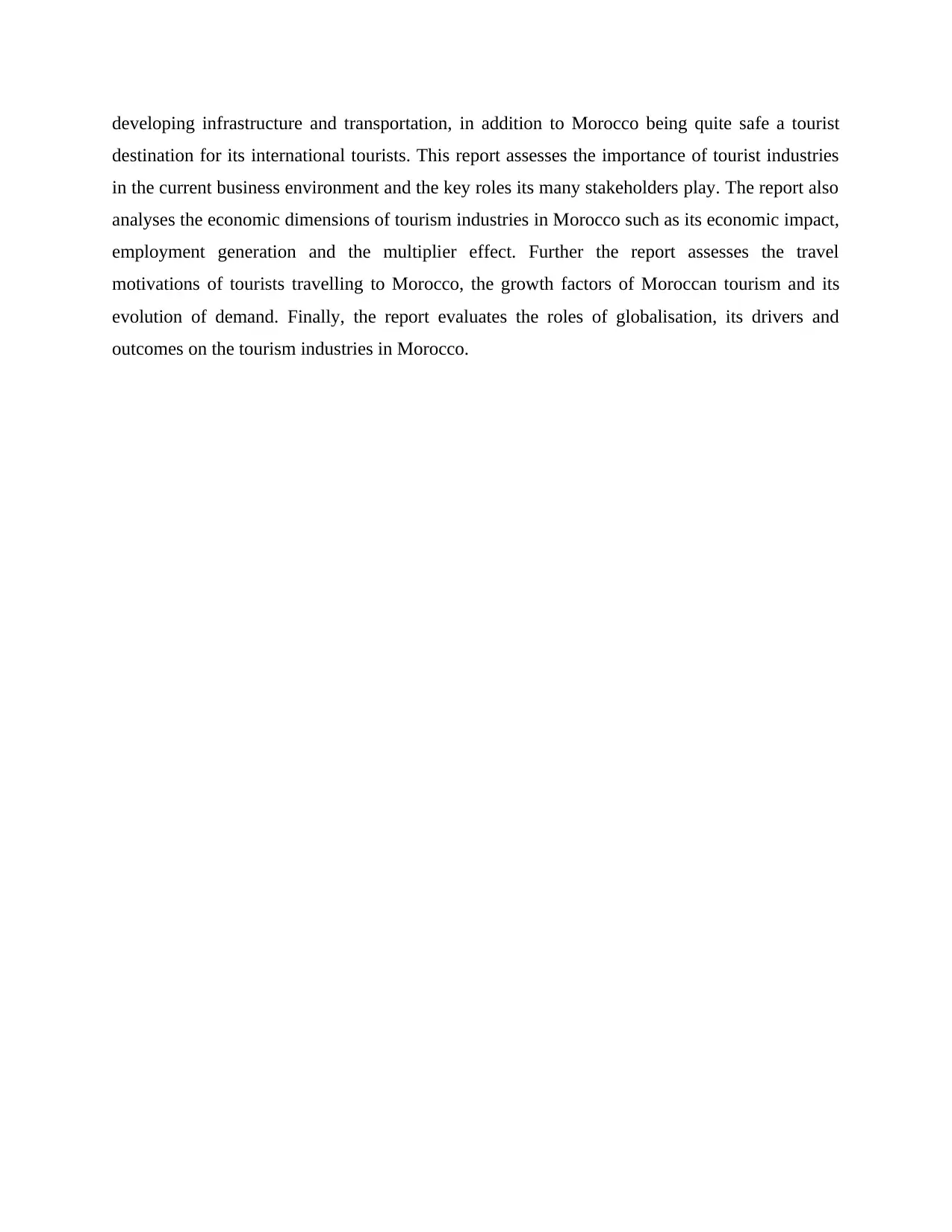
developing infrastructure and transportation, in addition to Morocco being quite safe a tourist
destination for its international tourists. This report assesses the importance of tourist industries
in the current business environment and the key roles its many stakeholders play. The report also
analyses the economic dimensions of tourism industries in Morocco such as its economic impact,
employment generation and the multiplier effect. Further the report assesses the travel
motivations of tourists travelling to Morocco, the growth factors of Moroccan tourism and its
evolution of demand. Finally, the report evaluates the roles of globalisation, its drivers and
outcomes on the tourism industries in Morocco.
destination for its international tourists. This report assesses the importance of tourist industries
in the current business environment and the key roles its many stakeholders play. The report also
analyses the economic dimensions of tourism industries in Morocco such as its economic impact,
employment generation and the multiplier effect. Further the report assesses the travel
motivations of tourists travelling to Morocco, the growth factors of Moroccan tourism and its
evolution of demand. Finally, the report evaluates the roles of globalisation, its drivers and
outcomes on the tourism industries in Morocco.
Paraphrase This Document
Need a fresh take? Get an instant paraphrase of this document with our AI Paraphraser
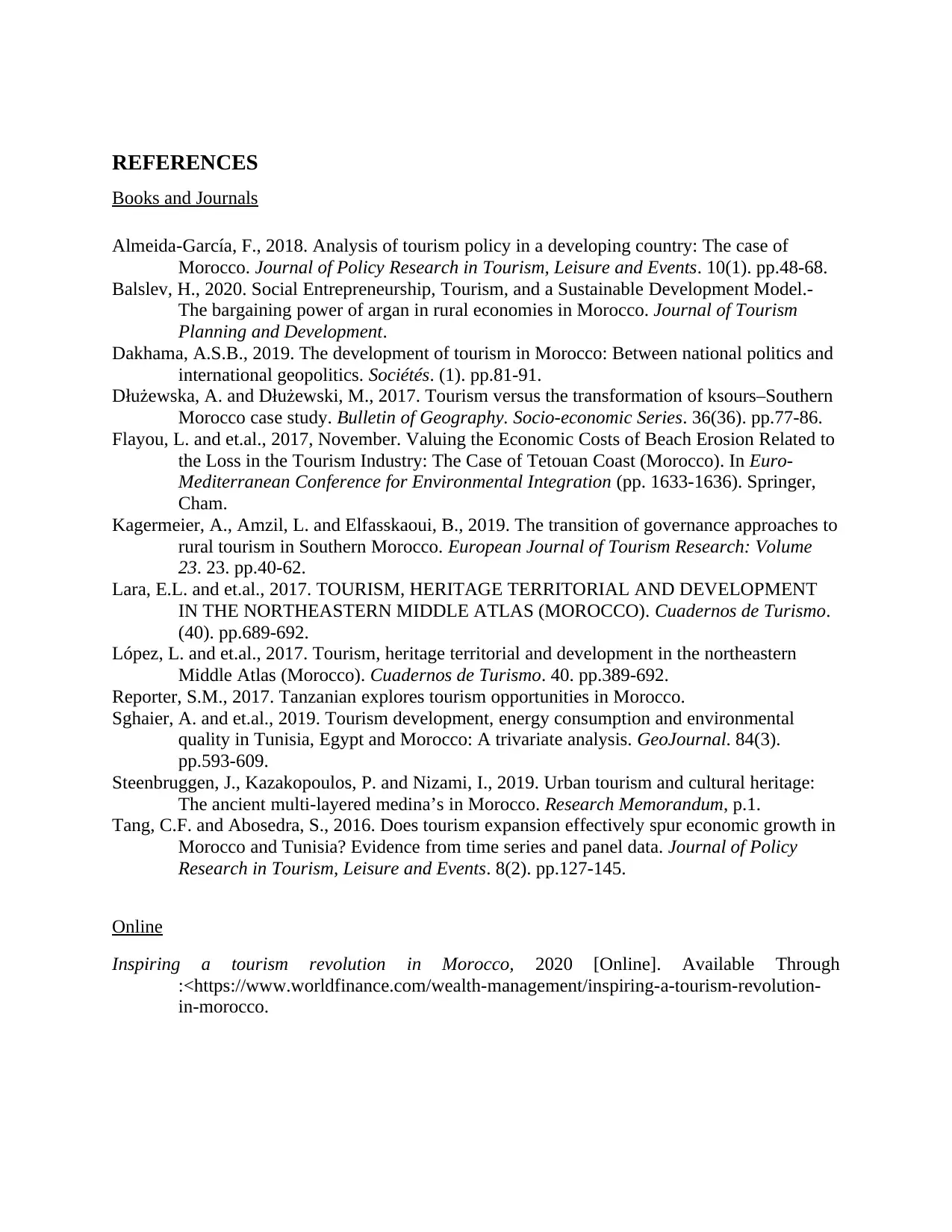
REFERENCES
Books and Journals
Almeida-García, F., 2018. Analysis of tourism policy in a developing country: The case of
Morocco. Journal of Policy Research in Tourism, Leisure and Events. 10(1). pp.48-68.
Balslev, H., 2020. Social Entrepreneurship, Tourism, and a Sustainable Development Model.-
The bargaining power of argan in rural economies in Morocco. Journal of Tourism
Planning and Development.
Dakhama, A.S.B., 2019. The development of tourism in Morocco: Between national politics and
international geopolitics. Sociétés. (1). pp.81-91.
Dłużewska, A. and Dłużewski, M., 2017. Tourism versus the transformation of ksours–Southern
Morocco case study. Bulletin of Geography. Socio-economic Series. 36(36). pp.77-86.
Flayou, L. and et.al., 2017, November. Valuing the Economic Costs of Beach Erosion Related to
the Loss in the Tourism Industry: The Case of Tetouan Coast (Morocco). In Euro-
Mediterranean Conference for Environmental Integration (pp. 1633-1636). Springer,
Cham.
Kagermeier, A., Amzil, L. and Elfasskaoui, B., 2019. The transition of governance approaches to
rural tourism in Southern Morocco. European Journal of Tourism Research: Volume
23. 23. pp.40-62.
Lara, E.L. and et.al., 2017. TOURISM, HERITAGE TERRITORIAL AND DEVELOPMENT
IN THE NORTHEASTERN MIDDLE ATLAS (MOROCCO). Cuadernos de Turismo.
(40). pp.689-692.
López, L. and et.al., 2017. Tourism, heritage territorial and development in the northeastern
Middle Atlas (Morocco). Cuadernos de Turismo. 40. pp.389-692.
Reporter, S.M., 2017. Tanzanian explores tourism opportunities in Morocco.
Sghaier, A. and et.al., 2019. Tourism development, energy consumption and environmental
quality in Tunisia, Egypt and Morocco: A trivariate analysis. GeoJournal. 84(3).
pp.593-609.
Steenbruggen, J., Kazakopoulos, P. and Nizami, I., 2019. Urban tourism and cultural heritage:
The ancient multi-layered medina’s in Morocco. Research Memorandum, p.1.
Tang, C.F. and Abosedra, S., 2016. Does tourism expansion effectively spur economic growth in
Morocco and Tunisia? Evidence from time series and panel data. Journal of Policy
Research in Tourism, Leisure and Events. 8(2). pp.127-145.
Online
Inspiring a tourism revolution in Morocco, 2020 [Online]. Available Through
:<https://www.worldfinance.com/wealth-management/inspiring-a-tourism-revolution-
in-morocco.
Books and Journals
Almeida-García, F., 2018. Analysis of tourism policy in a developing country: The case of
Morocco. Journal of Policy Research in Tourism, Leisure and Events. 10(1). pp.48-68.
Balslev, H., 2020. Social Entrepreneurship, Tourism, and a Sustainable Development Model.-
The bargaining power of argan in rural economies in Morocco. Journal of Tourism
Planning and Development.
Dakhama, A.S.B., 2019. The development of tourism in Morocco: Between national politics and
international geopolitics. Sociétés. (1). pp.81-91.
Dłużewska, A. and Dłużewski, M., 2017. Tourism versus the transformation of ksours–Southern
Morocco case study. Bulletin of Geography. Socio-economic Series. 36(36). pp.77-86.
Flayou, L. and et.al., 2017, November. Valuing the Economic Costs of Beach Erosion Related to
the Loss in the Tourism Industry: The Case of Tetouan Coast (Morocco). In Euro-
Mediterranean Conference for Environmental Integration (pp. 1633-1636). Springer,
Cham.
Kagermeier, A., Amzil, L. and Elfasskaoui, B., 2019. The transition of governance approaches to
rural tourism in Southern Morocco. European Journal of Tourism Research: Volume
23. 23. pp.40-62.
Lara, E.L. and et.al., 2017. TOURISM, HERITAGE TERRITORIAL AND DEVELOPMENT
IN THE NORTHEASTERN MIDDLE ATLAS (MOROCCO). Cuadernos de Turismo.
(40). pp.689-692.
López, L. and et.al., 2017. Tourism, heritage territorial and development in the northeastern
Middle Atlas (Morocco). Cuadernos de Turismo. 40. pp.389-692.
Reporter, S.M., 2017. Tanzanian explores tourism opportunities in Morocco.
Sghaier, A. and et.al., 2019. Tourism development, energy consumption and environmental
quality in Tunisia, Egypt and Morocco: A trivariate analysis. GeoJournal. 84(3).
pp.593-609.
Steenbruggen, J., Kazakopoulos, P. and Nizami, I., 2019. Urban tourism and cultural heritage:
The ancient multi-layered medina’s in Morocco. Research Memorandum, p.1.
Tang, C.F. and Abosedra, S., 2016. Does tourism expansion effectively spur economic growth in
Morocco and Tunisia? Evidence from time series and panel data. Journal of Policy
Research in Tourism, Leisure and Events. 8(2). pp.127-145.
Online
Inspiring a tourism revolution in Morocco, 2020 [Online]. Available Through
:<https://www.worldfinance.com/wealth-management/inspiring-a-tourism-revolution-
in-morocco.
1 out of 14
Your All-in-One AI-Powered Toolkit for Academic Success.
+13062052269
info@desklib.com
Available 24*7 on WhatsApp / Email
![[object Object]](/_next/static/media/star-bottom.7253800d.svg)
Unlock your academic potential
© 2024 | Zucol Services PVT LTD | All rights reserved.